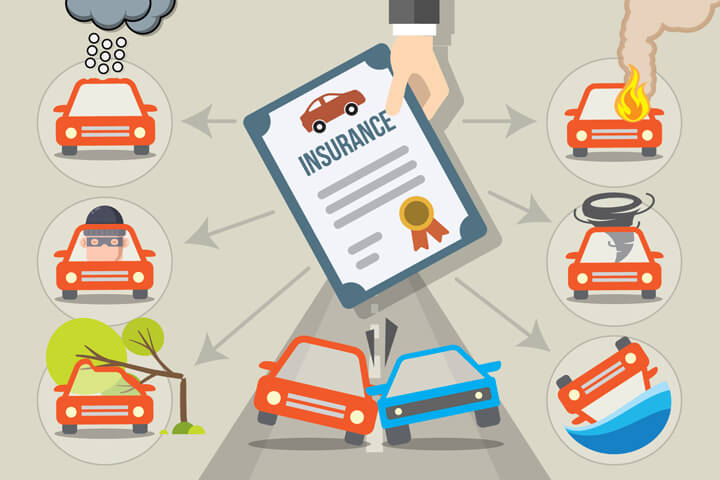Is tire damage from a pothole covered by car insurance?
Enter your Car Insurance Coverage FAQs zip code below to view companies that have cheap auto insurance rates.
Michelle Robbins
Licensed Insurance Agent
Michelle Robbins has been a licensed insurance agent for over 13 years. Her career began in the real estate industry, supporting local realtors with Title Insurance. After several years, Michelle shifted to real estate home warranty insurance, where she managed a territory of over 100 miles of real estate professionals. Later, Agent Robbins obtained more licensing and experience serving families a...
Licensed Insurance Agent
UPDATED: Jul 8, 2023
It’s all about you. We want to help you make the right coverage choices.
Advertiser Disclosure: We strive to help you make confident car insurance decisions. Comparison shopping should be easy. We are not affiliated with any one car insurance provider and cannot guarantee quotes from any single provider.
Our insurance industry partnerships don’t influence our content. Our opinions are our own. To compare quotes from many different companies please enter your ZIP code on this page to use the free quote tool. The more quotes you compare, the more chances to save.
Editorial Guidelines: We are a free online resource for anyone interested in learning more about auto insurance. Our goal is to be an objective, third-party resource for everything auto insurance related. We update our site regularly, and all content is reviewed by auto insurance experts.
Winters can be really hard on roads. The constant freezing and thawing combined with heavy snowplow equipment can result in a minefield of potholes on any road, especially in the states with the worst rural roads.
As hard as you try, sometimes it’s just not possible to avoid hitting a pothole at high speed, resulting in major damage to not only your tire and wheel, but also possibly your suspension, steering components, and exhaust.
So the question is if you hit one of these potholes and sustain damage to your car, will your car insurance policy pay for the damages?
It’s kind of a tricky question because of the way some insurance companies word their policy. First, you need to have collision coverage on the affected vehicle. If you do not have that, end of the story. You do not have coverage.
If you do have collision coverage, then we can dig into the policy and see if pothole damage is a valid claim or not.
In a standard auto policy, the insuring agreement for Part D coverage (Coverage for Damage to your Auto) reads:
We will pay for direct and accidental loss to “your covered auto” or any “non-owned auto”, including their equipment, minus any applicable deductible shown in the Declarations.
“Collision” means the upset of “your covered auto” or a “non-owned auto” or their impact with another vehicle or object.
So you were driving your own car (or someone else’s that you do not have regular access to), it is insured with collision coverage, the damage was direct and accidental (assuming you did not intentionally destroy your car), and the pothole is an “object”. Sounds like a covered claim, right?
If we keep reading the policy, there is a section for coverage exclusions that goes and takes coverage away for certain things like wear and tear, mechanical issues, and really vague stuff like civil war and insurrection.
One of the exclusions reads:
We will not pay for damage due and confined to:
- Wear and tear
- Freezing
- Mechanical or electrical breakdown or failure
- Road damage to tires
Free Auto Insurance Comparison
Enter your zip code below to view companies that have cheap auto insurance rates.
Secured with SHA-256 Encryption
Now we know what you’re thinking: “Dang, I don’t have a claim”. But there is a twist to this scenario. If the damage extends beyond just your tire, then you have coverage under your collision coverage. Nowadays, vehicle wheels cost more than a new tire, so if the wheel is scratched or bent, that will be covered, as well as any damage to other components of your vehicle.
If the damage is just to your tire, your company may opt to provide coverage, but the problem is you have a deductible to pay before any payment is made. So unless you have ultra-high-performance tires or massive off-road mudslingers, along with with a super-low deductible, chances are that your deductible is higher than the cost of a new tire anyway.
Another thing to consider is whether or not you want to file a claim anyway. Collision claims are frowned upon by insurance companies, unlike comprehensive claims. A collision claim is usually considered a ‘chargeable’ claim, which means you would lose any claim-free discounts you might be receiving on your policy. It’s kind of like your driving record and having a chargeable speeding ticket.
So if the damage is extensive, go ahead and file that claim. That’s what insurance is for. But if filing a claim will only get you a few hundred bucks from your company after paying your collision deductible, you might want to reconsider the claim and just pay for the damages out-of-pocket.
Tire damage may be covered if you purchased a road hazard warranty the last time you bought new tires. So if it’s just a blown sidewall with no other damage to your vehicle, and you do have a tire warranty, that should be covered and you can replace the tire at no cost.
Use our FREE quote tool to compare insurance rates now!
Case Studies: Tire Damage from Potholes and Car Insurance Coverage
Case Study 1: John’s Sudden Pothole Encounter
John was driving along a city street when he hit a deep pothole, causing damage to his tire. With collision coverage in place, John filed a claim and paid his deductible. The insurance company covered the remaining repair costs, allowing John to replace the tire without bearing the full expense.
Case Study 2: Sarah’s Costly Suspension Damage
Sarah encountered a large pothole on the highway, leading to damage not only to her tire but also to her suspension system. Despite having collision coverage, Sarah’s policy excluded coverage for mechanical issues. As a result, she had to cover the repair costs for both the tire and suspension components.
Case Study 3: Mark’s Road Hazard Protection
Mark had a road hazard warranty for his tires when he hit a pothole that caused a blowout. Thanks to the warranty, Mark received a replacement tire at no cost. This coverage saved him from paying for a new tire out-of-pocket and provided peace of mind against unexpected road hazards.
Frequently Asked Questions
Is tire damage from a pothole covered by car insurance?
Tire damage from a pothole may be covered by car insurance, depending on your specific policy. If you have collision coverage, which is an optional coverage, it can help pay for damages to your vehicle caused by hitting a pothole. However, it’s important to note that collision coverage typically requires you to pay a deductible before the insurance company covers the remaining cost. Additionally, filing a collision claim may be considered a chargeable claim and could result in the loss of any claim-free discounts on your policy. It’s advisable to assess the extent of the damage and consider the cost of repairs versus your deductible before deciding whether to file a claim.
What does collision coverage typically include?
Collision coverage is an optional coverage that helps pay for damages to your vehicle resulting from a collision with another vehicle or object, including potholes. If your vehicle sustains damage due to hitting a pothole, collision coverage can assist with the cost of repairs. However, collision coverage usually requires the payment of a deductible, and filing a claim may impact your insurance premiums.
Are there any exclusions or limitations to coverage for pothole damage?
Some insurance policies may include exclusions or limitations for pothole damage. It’s important to review your policy documents to understand the specific terms and conditions of your coverage. Exclusions for pothole damage may vary, but common exclusions could include wear and tear, mechanical issues, or specific circumstances like civil war or insurrection. Additionally, if the damage is limited to your tire only, your insurance company may provide coverage, but you will still be responsible for paying the deductible. Consider your deductible amount and the cost of a new tire to determine if filing a claim is worthwhile.
Should I file a claim for pothole damage?
The decision to file a claim for pothole damage depends on several factors. If the damage is extensive and the cost of repairs is significant, filing a claim may be appropriate. However, it’s important to consider the deductible amount and the potential impact on your insurance premiums. Since collision claims are often considered chargeable claims, filing a claim for minor damage that would result in a small payout from the insurance company may not be financially beneficial. In such cases, paying for the repairs out-of-pocket may be a more sensible option.
Can tire damage from a pothole be covered by a road hazard warranty?
Tire damage from a pothole may be covered if you have purchased a road hazard warranty when you bought new tires. A road hazard warranty is a separate warranty that covers damages to your tires resulting from hazards such as potholes, nails, or other road debris. If your tire sustains damage, such as a blown sidewall, and you have a tire warranty in place, you may be able to replace the tire at no cost. However, it’s important to review the terms and conditions of your specific warranty to understand the coverage and any limitations that may apply.
Frequently Asked Questions
- What is a named operator policy?
- Will Geico insure a car not in my name?
- What Is Covered in a Jeep Powertrain Warranty? 2025
- Cheapest Jeep Insurance Rates in 2025
- Do trucks cost more to insure?
- How long does a DUI stay on your record?
- Does the Porsche Club of America offer car insurance?
- View All Coverage Questions
Popular Rate Quotes
- Dodge Ram Insurance
- Toyota Sienna Insurance
- Toyota Rav4 Insurance
- Ford F-150 Insurance
- Chevrolet Silverado Insurance
- Hyundai Sonata Insurance
- Nissan Rogue Insurance
- Honda Accord Insurance
- Toyota Corolla Insurance
Compare Rates and Save
Find companies with the cheapest rates in your area





